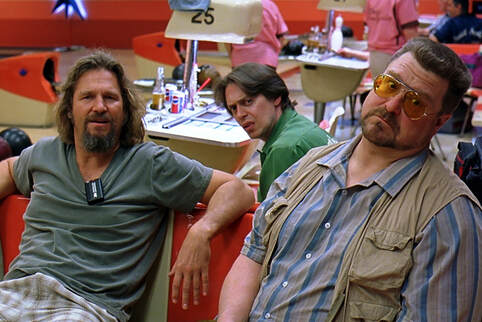A | A slacker gets pulled into a kidnapping and ransom plot. Directed by Ethan and Joel Coen Starring Jeff Bridges, John Goodman, and Steve Buscemi Review by Jon Kissel |

The Dude encounters nihilists, brutalist cops, avant garde artists, embezzling Reaganites, and callow teenagers, and the refrain of the film is ‘fuck it, let’s go bowling.’ All of this action is taking away from what The Dude wants to be doing at any given moment. The Big Lebowski opens at middle-aged man paradise i.e. the bowling alley, a place where men who have gone to seed can briefly pretend to be skilled athletes. They stick their sausage fingers over the hand dryers like they’re Lebron James with his pregame chalk. No one would think to comment when the Dude stretches shamelessly and the elastic band of his ratty underwear shows, or tell him to tuck his balls back into his shorts when they inevitably fall out following a sitting position that’s too relaxed. The Coens, with usual cinematographer extraordinaire Roger Deakins, make the bowling alley look beautiful, all polished floors and aerosoled shoes. Thanks to their indelible visualization, the stakes of the film are established. Everything else is a waste of time and a distraction. Enough with this kidnapping plot, the league semis are coming up.
The Dude is a composite character constructed from several guys in the Coens’ orbit, but the main inspiration is Jeff Dowd, who, like The Dude, was a member of a 70’s radical anti-Vietnam group. In the intervening two decades, Nixon and Reagan were both reelected in unfathomable landslides and the Democratic party responded by becoming a moderately more tolerant version of the Republicans. People like The Dude were left politically homeless, unless they did the Boomer thing of trading their youthful values for suburbia and the corporate ladder. The Dude’s response to such a total defeat is to check out in a chemical haze, but his most charming moments are when his old values peak through, namely a youthful talent for sniffing out phonies. Being a 70’s radical is to know that you were right about everything, that all these besuited martinets were monstrously misguided, and that none of it mattered. They kept their suits and their position, but the one thing that people like The Dude get to hang onto is the death of any respect owed to the supposed elites. The Dude gets to wield it against Lebowski, a pathetic man who must be infuriated that there’s a picture of him with Nancy Reagan on his wall, but not Ronald. His bluster about the loss of the bums bounces harmlessly off The Dude, and the film gloriously reveals that Lebowski’s a bum himself. The film judges Lebowski the harshest, but plenty of other characters share his sin of overestimation of his abilities and achievements. The way out of this sin is to have no abilities or achievements and simply abide.
The other character paralyzed by their 70’s experiences is Walter, as portrayed titanically by the great John Goodman. The Big Lebowski has approximately two dozen memorable characters, some high on the call sheet and some in one or two scenes. Walter is the one that most leaps off the screen. The Dude has reacted to his youthful experiences by dropping out, but Walter is still holding onto all his rage at being used and discarded for no purpose by his government. His dialogue is the most memorable and the most dense, as he often is having two or three conversations simultaneously. He can move effortlessly between a racist diatribe aimed at Gulf War era Iraqis and a scolding on un-PC terms for Chinese people, from cursing out Donny to earnestly asking him for a desperately needed piece of information about their next bowling match. He’s a bloviator who’ll point a gun in a harmless hippie’s face, and then he’ll meekly walk his unseen ex-wife’s dog. He gets Donny killed by escalating a fight with the nihilists that could’ve been deescalated with a pitiful handful of cash, and then tenderly cradles his friend as he has a heart attack. Goodman’s been working with the Coen’s since Raising Arizona and he’ll continue to show up in their films after this, but this is the high point of his collaboration with them, and by extension his whole career.
A movie is achieving the peak of the art form when every second contains something worth remarking upon. Daniels is making some kind of face or tiny exclamation, Buscemi is scrunching his nose up in confusion, Goodman or John Turturro’s Jesus is dressed in some specific way, an extra is briefly pulling focus, or hundreds of other little grace notes. Larry’s dad is in an iron lung! Karl Hungus! The Big Lebowski remains a perfect movie. Theoretical pushback could be applied to its disposability but its themes, such as they are, are completely within the wheelhouse of its creators, and their film about the ultimate slacker embodies the submission to the uncaring universe that preoccupies so many Coen movies. Want little more than a relaxing evening at the bowling alley, and find happiness. Even better, watch The Big Lebowski for the hundredth time and continue to be awed by its impeccable rhythms. Its oiled lanes guide the way to nirvana. A+
 RSS Feed
RSS Feed